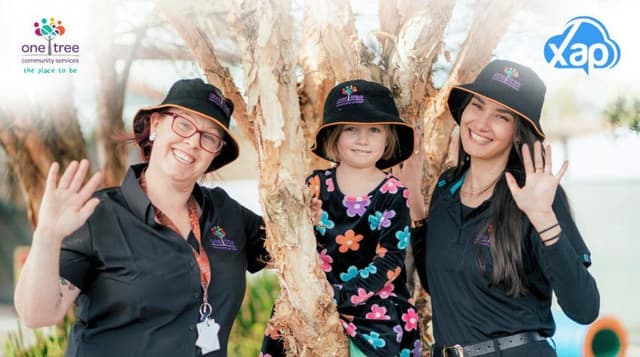Enterprise Solutions
Combining childcare and aged care has social and economic benefits

Jason Roberts
Sep 04, 2018
Save
What happens when you bring a group of older residents to mix with young children in childcare? Clapping hands and singing songs is just one way they spend the morning together. These interactions are made possible by intergenerational care programs that have gained popularity in Australia in recent years.
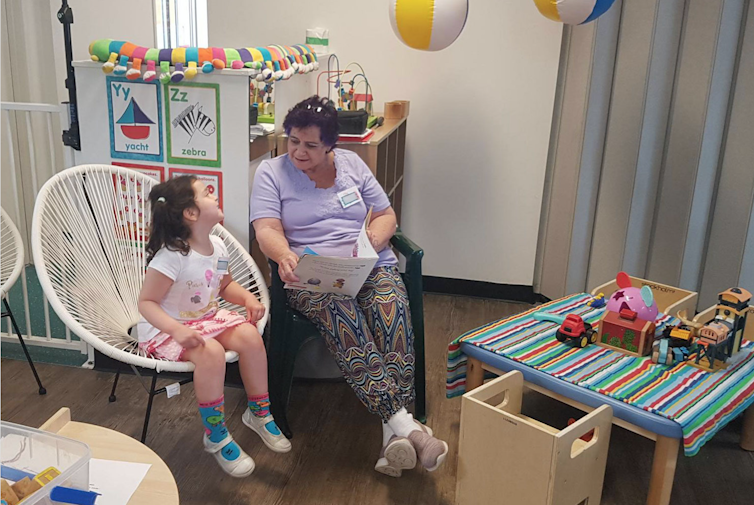
Intergenerational care programs provide older adults and children aged three to five with care and social support in the same setting, for short periods of time. This has mutual benefits.
The widespread implementation of intergenerational care programs has the potential to solve many of today’s economic challenges associated with child and aged care, while enhancing the educational and social benefits in encouraging relationship building between generations.
Intergenerational care programs in Australia
Although intergenerational care programs are popular in the US and UK, they’re in their infancy in Australia.
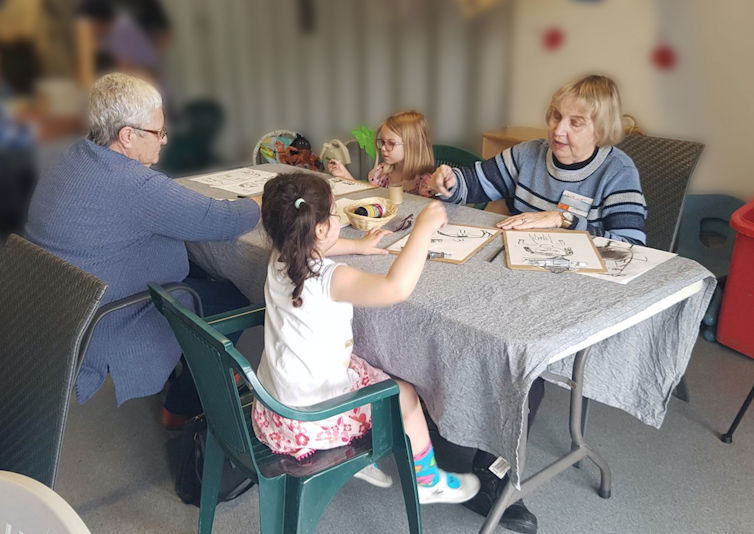
Given changing economic, demographic and social pressures in Australia, there’s an increased need for quality and cost-effective care arrangements for both older people and young children.
There’s an anticipated rise in demand for formal care services associated with an ageing population in Australia. This is further compounded by an increase in people not having children, shifts in perceptions of family obligations for caring, rising divorce rates and rising female employment rates.
Accompanying the unprecedented demand for formal aged care services is the limited supply of such care. Finding appropriate care for both older people and young children in Australia is often difficult and unsuitable for the person in need of care or their carer.
The increase in demand for formal care services and the shortage of supply of such care highlights the need for alternative models. This includes models such as intergenerational care. But current intergenerational programs in Australia tend to operate in residential aged care facilities, lack a formalised program based on educational teaching strategies, and don’t keep track of or evaluate participant outcomes.
The Griffith University Intergenerational Care Project
The Griffith University Intergenerational Care Project focuses on trialling two models of care:- a shared campus model where an aged care centre is located in the same place as a childcare centre
- a visiting campus model where childcare and aged care centres are located separately and one group travels to visit the other.
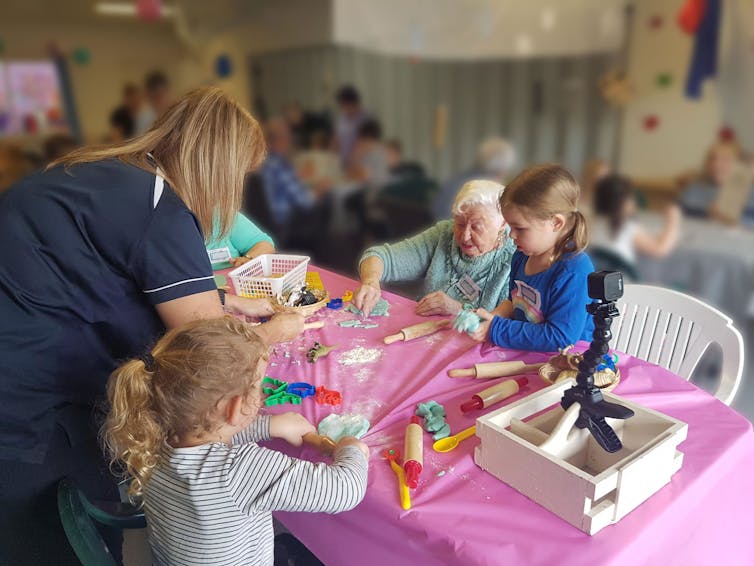
The psychological and social benefits of intergenerational care programs are well recognised. Griffith University’s Intergenerational Care Project is investigating the educational, workforce and economic benefits intergenerational care programs can bring to Australia.
This research is now well underway and is being conducted across four locations within Queensland and NSW. It’s conducted with older adults living with dementia and children aged three to five years.
In this program, older people and children meet for one hour each week over 16 weeks. They partake in shared activities designed to enhance engagement between generations.
Preliminary results suggest the reception of the program has been positive. Both younger and older participants expressed excitement and joy at being able to interact with each other.
Benefits of intergenerational care
Intergenerational care programs give children the opportunity to learn from and connect with an older generation, improve children’s behaviour and attitude towards older people, and enhance the overall well-being of both young and old participants.Read more:Combining daycare for children and elderly people benefits all generations
For older participants, intergenerational care programs allow them to pass on their knowledge and interact with young children in a meaningful way. As a result, they feel an improved sense of life meaning and enhanced self-worth.
Broader benefits
Community perceptions of older adults and ageing also tend to shift from negative to positive. This is especially important because older people want to be treated as valued members in society.Intergenerational care programs enhance the quality of relationships between ageing people and children, and challenge ageist stereotypes.Intergenerational care programs create a strong opportunity to address ageism in society from an early age and challenge people’s assumptions about the contributions of people living with dementia or experiencing other forms of cognitive decline.
This is particularly important in Australia. It’s projected by 2050 about one million people will be living with a dementia-related illness. This represents an increase of 254% since 2011.
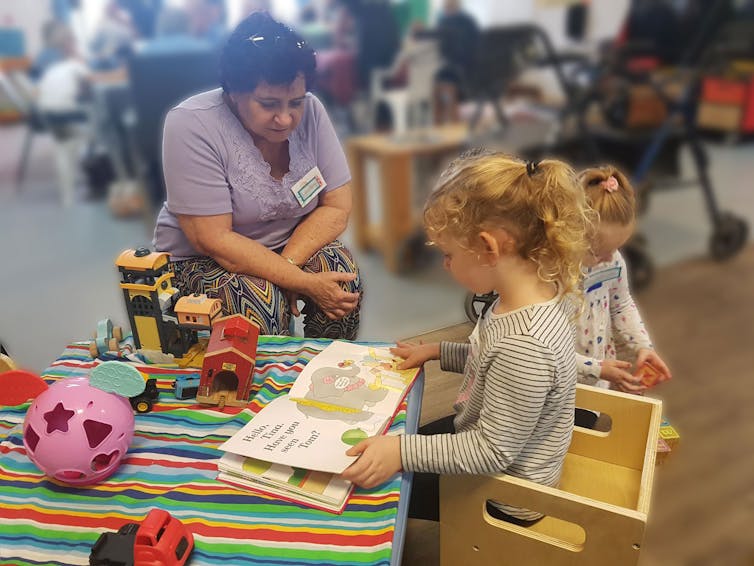
Delivering intergenerational programs in one location is also attractive because of anticipated cost savings. Both aged care and childcare organisations can decrease total running costs by sharing resources such as skilled labour, learning materials, and buildings.
Our preliminary workforce interview findings suggest intergenerational care is a career path that interests staff. It also suggests creating a training qualification to enable this career path may address workforce shortages in both child care and aged care.
Read more:What happened when we introduced four-year-olds to an old people's home
Intergenerational care programs offer an effective alternative model of care in Australia in the face of increasing economic, demographic and social pressures. An extensive rollout of such programs has the potential to give families access to more, higher quality childcare, and helps older people feel like valued members of society.
Anneke Fitzgerald, Professor, Griffith University; Katrina Radford, Lecturer, Deputy Director Research IBAS, Griffith University, and Lalitha Kirsnan, Marketing and Communications Officer, Intergenerational Care Project, Griffith University
This article was originally published on The Conversation. Read the original article.
Don’t miss a thing
Related topics
Enterprise Solutions
General News
Marketplace
Products
Services
Corporate activity
Understanding Children
Compliance
Advocacy
In The Field
Leadership
Personnel Appointments
Affordability & Accessibility
Professional development
Other
Property
















